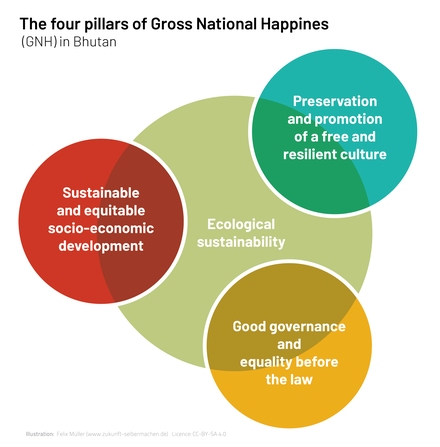In an era dominated by economic excess and material acquisition, it is vital to explore alternative paradigms that redefine what constitutes wealth and well-being. Have you ever pondered the intricate relationship between spirituality and prosperity? This exploration leads us to the Bahá’í teachings on Gross National Happiness (GNH), a concept that advocates for a holistic approach to wealth, transcending mere financial metrics. This article delves into the Bahá’í perspective on GNH, revealing how spiritual principles intertwine with national happiness, fostering a deeper understanding of the human experience.
The very notion of Gross National Happiness stems from the idea that true wealth encompasses much more than economic indicators. In a Bahá’í context, happiness is not only a subjective experience but a composite reflection of societal harmony, individual fulfillment, and moral growth. The teachings of Bahá’u’lláh emphasize that the foundation of any prosperous society lies in the wellbeing of its members, which encapsulates emotional, social, and spiritual dimensions.
Understanding the Framework of Gross National Happiness
GNH asserts that prosperity should be evaluated through the lens of happiness rather than through GDP figures alone. This approach advocates for a sustainable model of development, wherein economic growth serves to enrich the quality of life for all citizens. The Bahá’í Faith underscores the essential unity of humanity, positing that individual happiness is inextricably linked to the happiness of others.
The framework of GNH can be categorized into several key pillars: economic, social, environmental, and cultural. Each of these components harmonizes with Bahá’í teachings, which advocate for justice, equity, and environmental stewardship. By nurturing these facets, societies can cultivate an atmosphere of surpassing contentment and fulfillment.
The Role of Spirituality in Measurement
How does one adequately measure happiness? Traditionally, metrics such as income levels and employment rates are employed, yet they often fail to capture the intangible elements that contribute to well-being. In the Bahá’í paradigm, the spiritual dimension plays an instrumental role in understanding happiness. Spirituality enriches human existence by fostering virtues such as compassion, love, and altruism. These qualities, in turn, cultivate environments where collective joy flourishes.
The Bahá’í teachings suggest that when individuals engage in acts of service and community-building, this not only amplifies their own sense of purpose but also enhances the overall happiness within their communities. Hence, the measurement of happiness should integrate subjective assessments—personal reflections on fulfillment and community engagement—alongside observable metrics.
The Integral Relationship of Wealth and Happiness
A prevailing challenge exists: Bridging the gap between economic wealth and spiritual richness. While material resources can facilitate a certain level of comfort, they do not inherently breed happiness. The Bahá’í teachings advocate for a balanced approach, where material wealth should be viewed as a means to achieve greater ends, rather than ends in themselves. This perspective invites societies to re-evaluate their values and prioritize investments in education, healthcare, and social equity, all of which foster genuine happiness.
Moreover, the concept of ‘spiritual wealth’ emerges, referring to the enrichment one’s life gains through virtues and moral character. Investing in one’s inner life—through mentorship, community development, and the pursuit of knowledge—creates a holistic sense of wealth that transcends economic measures. These initiatives illuminate the path toward national happiness by forging connections that affirm our shared humanity.
Promoting Compassionate Governance
What role does governance play in achieving GNH? In the Bahá’í view, effective governance should be characterized by compassion and a commitment to serving the greater good. Leaders are seen as custodians of public welfare, embodied with the responsibility to create policies that promote equitable opportunities for all. This means not only addressing economic disparities but considering social and spiritual education as integral components of national policy. Hence, the system of governance must reflect ethical principles that resonate with the broader populace’s aspirations for a fulfilling life.
Models of governance underpinned by participatory frameworks can empower citizens, giving them a voice in shaping policies that directly affect their happiness. This participatory ethos invites diverse perspectives and cultivates an inclusive environment, augmenting societal cohesion and shared purpose.
Engendering Societal Transformation
To instigate meaningful change, it is imperative for individuals to engage critically with the principles of GNH. This involves active participation in community service, advocacy for sustainable practices, and a commitment to justice. The transformative potential of GNH lies in its call for individuals to rise above self-interest in favor of collective well-being, resonating deeply with Bahá’í teachings of oneness and interdependence.
Ultimately, in a world often divided by materialistic ideology, the embodiment of GNH as a spiritual approach to wealth beckons us to reconsider our priorities. It challenges us to forge connections that uplift others, creating not merely a prosperous existence but a fulfilling life anchored in shared joy and collective responsibility. The journey toward Gross National Happiness, viewed through this spiritual lens, invites a reevaluation of how we perceive wealth, urging us to seek balance between material affluence and spiritual richness.
Thus, the Bahá’í teachings illuminate a pathway forward, one that promises not only the pursuit of individual happiness but the elevation of society as a whole. In doing so, we embark on an exploration that transcends traditional economic paradigms, inviting us to create a world where happiness, harmony, and spiritual fulfillment reign supreme.
